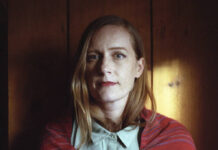

Lurking beneath the chrome-finished, gee-whiz, retro-futurist, gimcrackery of “Tomorrowland” lies a simple little message: “get off of my lawn, you damn kids.”
“Tomorrowland” is an old man. An angry old man who traded in his shoutin’ porch for a shiny new jetpack and just doesn’t get these kids of today. “Tomorrowland” glares at all of those cynical teens, in their Snapchat hoodies (or whatever. Damn kids!), from his kitchen window and wonders, bitterly, what those snotty, little upstarts see in things like “The Walking Dead” and “Mad Max: Fury Road.”
“Back in my day, we didn’t fetishize the apocalypse,” “Tomorrowland” says to a visiting nurse who is clearly disinterested. “We dreamed of a future where cars would float, and monorails were shiny and the only thing America had to fear was cyber-polio.” “Tomorrowland” then mumbles something about everybody’s carbon footprint being “too damn big,” drinks a big bottle of Ensure and breaks his hip simply as a token gesture. In short, like all fatuous baby-boomers, “Tomorrowland” is something to be avoided.
I’ve never been more annoyed by a movie than I was with “Tomorrowland.” It’s a film where corporate synergy, steampunk and soft-focused, watered down nostalgia come together to sloppily grope each other in the dark. It’s a film that opens with two unlikable characters bickering with each other and closes with Hugh Laurie performing the monologue equivalent to that ‘shame, shame, shame’ gesture you give to a three-year-old who just dumped the contents his sippy cup on the kitchen floor.
Guided under the auspices of director Brad Bird – whose entire filmography seems to imply that he keeps remaking the same “Highlights for Children” adaptation of “The Fountainhead” – and Damon Lindelof – the hack who turned “Lost” into an unappetizing buffet of pure stupid, “Tomorrowland” tells the story of a former boy genius, turned embittered creator of very convincing dog holograms (George Clooney) and an annoyingly precocious girl genius of undetermined age (Britt Robertson) who we’re told is more special than a million Harry Potters giving birth to a billion Katniss Everdeens but mostly just whines out expository dialogue and burps.
At any rate, these two reluctantly join forces to visit Tomorrowland, a place that could be set in some unknown point in the future or possibly another dimension entirely. When they finally arrive, bad-guy Laurie pissily recaps the plot to “An Inconvenient Truth,” fat shames the world and wants to destroy humanity because they killed most of the bees and didn’t bring their own bag to Whole Foods. Eventually, a scene that unintentionally appears to pay homage to that Coke ad Don Draper wrote in the “Mad Men” finale appears, and the movie ends.
Throughout its 130 minutes, there are only two moments in “Tomorrowland” that register. The first, a well-staged action sequence in Clooney’s booby-trapped house that plays like a deleted sequence from one of Bird’s Pixar films. The other shows a knee-high, child-Clooney prancing through an accurate recreation of Disney’s exhibits at the 1964 World’s Fair. Everything else either wallows in the shame-based, hard sell approach to environmentalism that enveloped pop-culture in the early ’90s or pure, buck-ass stupidity. Are we supposed to believe Laurie single-handedly built an army of killer robots and sent them into the past (or another dimension or whatever)? Does this Disney movie have no problem showing killer robots murder innocent bystanders? OK, so Laurie wants to destroy humanity to protect Tomorrowland, right? Does he realize it’s just an abandoned pile of concrete and killer robot parts? What’s he protecting? Space Mountain?
But the dumbest and most ill-advised aspect behind “Tomorrowland” lies with the character Athena (Raffey Cassidy) an android resembling a 9-year-old girl who broke knee-high Clooney’s heart. She symbolizes his wasted potential and idealized youth. This subtext is undercut by the scenes in which Clooney argues with this child-like android with the bitterness of a jilted ex-lover. To be fair, it’s not overwhelmingly creepy, just creepy enough. Especially considering that his character still harbors feelings for her.
Sadder still, in spite of Bird’s background in animation, his vision of the future is decidedly warmed over and looking phonier and more sterile than the film’s phony, sterile inspiration. Self-satisfied, self-important and preachy, “Tomorrowland” definitely smacks as a personal project mostly because I doubt anyone, but Bird would want to sit through this.




